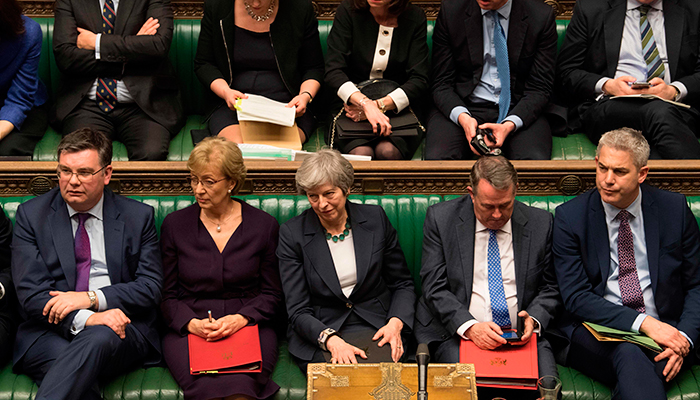Brexit set for delay after May wounded by rejection of 'no-deal'
March 14, 2019

LONDON: The British parliament on Wednesday rejected leaving the European Union without a deal, further weakening Prime Minister Theresa May and paving the way for a vote that could delay Brexit until at least the end of June.
After a day of high drama, MPs defied the government by voting 321 to 278 in favour of a motion that ruled out a potentially disorderly “no-deal” Brexit under any circumstances.
It went further than the government’s position of keeping the threat of a “no-deal” Brexit on the negotiating table — a stance many in her party said was essential to push Brussels to make further concessions to the deal they have rejected.
While the approved motion has no legal force and ultimately may not prevent a no-deal exit, it carries considerable political force, especially as it passed thanks to a rebellion by members of May’s own Conservative Party and her cabinet.
May, who still insists it is not possible to rule out a no-deal Brexit entirely, said MPs would need to agree a way forward before an extension could be obtained.
The European Commission repeated that a delay would indeed require a justification 1 but positive comments from Germany and Ireland suggested that EU members at last saw a prospect that a viable deal would be found, and were inclined to help.
The pound GBP= rose more than 2 percent on the rejection of 'no-deal' and was headed for its biggest daily gain this year.
The government said there were now two choices - agree a deal and try to secure a short delay to Brexit, or fail to agree anything and face a much longer delay.
May said her preference was for a short delay, which would mean the government trying to pass the deal she negotiated by the middle of next week.
Third attempt
She hopes to find a way to persuade hardline pro-Brexit MPs to back her deal at the third attempt, on the grounds that the alternatives offer a less clean break with the EU.
But on Wednesday evening, senior eurosceptic MPs were defiant, with one, Steve Baker, declaring they would keep on voting against May’s deal if it was put forward again.
Another eurosceptic Conservative lawmaker, Andrew Bridgen, said parliament no longer represented “the people”, who had voted for Brexit, by 52 percent to 48, in a referendum in 2016.
“This is very dangerous territory we are going into with regard to our democracy,” he told Reuters.
In the text of a motion scheduled for a vote on Thursday, the government said if a deal was reached by March 20, the day before an EU summit, Britain would ask for the Brexit negotiating period to be extended from March 29, the date set in law, until June 30, just before the new European Parliament meets.
If no deal was agreed by March 20, “then it is highly likely the European Council at its meeting the following day would require a clear purpose for any extension, not least to determine its length, and any extension beyond 30 June 2019 would require the United Kingdom to hold European Parliament elections in May 2019”, the motion said.
“This is very dangerous territory we are going into with regard to our democracy,” he told Reuters.
In the text of a motion scheduled for a vote on Thursday, the government said if a deal was reached by March 20, the day before an EU summit, Britain would ask for the Brexit negotiating period to be extended from March 29, the date set in law, until June 30, just before the new European Parliament meets.
If no deal was agreed by March 20, “then it is highly likely the European Council at its meeting the following day would require a clear purpose for any extension, not least to determine its length, and any extension beyond 30 June 2019 would require the United Kingdom to hold European Parliament elections in May 2019”, the motion said.











